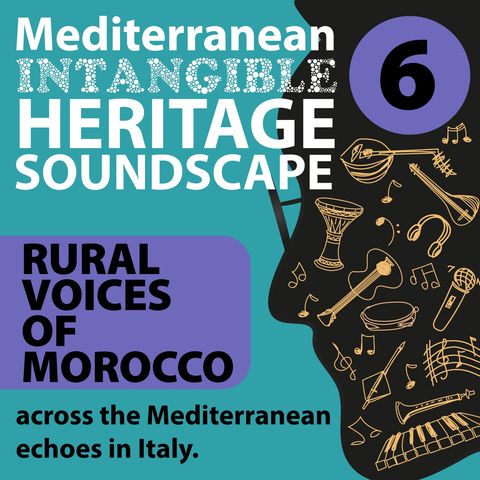Rural voices of Morocco across the Mediterranean echoes in Italy.

Scarica e ascolta ovunque
Scarica i tuoi episodi preferiti e goditi l'ascolto, ovunque tu sia! Iscriviti o accedi ora per ascoltare offline.
Descrizione
Who are the Moroccan professional female singer-dancers (shikhat) from the rural Atlantic plateau? And what the Moroccan migrants in Italy, in particular the community of workers in Umbria, listen to?...
mostra di piùAnd what the Moroccan migrants in Italy, in particular the community of workers in Umbria, listen to?
These and many other questions arise from the fieldwork experiences of Alessandra Ciucci in Morocco and Central Italy on the waves of the harsh sound of the ‘aita and the ‘abidat r-rma musical traditions. To explain the role of the female entertainers and the social environment where they came from, and to investigate what the community of Moroccan workers of Umbria like to listen to during their leisure time, she uses differents tools crossing ethnomusicology, popular music, gender and post-colonial studies.
About Alessandra Ciucci
Alessandra Ciucci is Associate Professor of Music (Ethnomusicology) at Columbia University. She received a PhD in music (ethnomusicology) from the City University of New York at the Graduate Center. Her research interests include: the music of Morocco, the Maghreb, the Mediterranean, gender and sexuality, sung poetry, popular music of the Arab world, and music and migration. Her first book, The Voice of the Rural (University of Chicago Press, 2022), explores the significance and the endurance of a specific notion of the rural (l-'arubiya), in music, poetry and the voice among migrant Moroccan men in the Umbria region of Italy. This Monograph interrogates how the idea of l-'arubiya, which is entangled with a sense of place, longing and belonging, becomes particularly meaningful in Italy where it articulates a personhood rooted in a masculinity that is denied to Moroccan men though their labor and migratory status.
Read more
Episode's musical sources list
Hadik Muimti
Fatna bent l-Houcine
Intro
Khadija Al-Bidawiya
Kharbusha
Fatna bent l-Houcine & Ouled Ben Aguida
Fina Houma
B. Elbidaoui - Kibbou - B. Znaiga
Kharbusha
Fatna bent l-Houcine & Ouled Ben Aguida
Aita
Ouled Ben Aguida with Hafida Hasnaoui e Aicha Nouni. "l-Aloua". Wedding Celebration July 2003 (Alessandra Ciucci field recording at a wedding party, men and women were present)
Kharbusha
Fatna bent l-Houcine & Ouled Ben Aguida
El Aid
Khadija Al-Bidawiya
Abidat r-rma
Shikh l-Bachir. "l-Ghaba"
El Aid
Khadija Al-Bidawiya
Abidat r-rma
Shikh Sharqi. Wedding Celebration. July 2017 (Alessandra Ciucci field recording at a wedding party for men only. Audio of a video of Shikh Sharqi where he plays scissors and musicians around him imitate the sound of hunters and dogs chasing prey).
Disclaimer
Mediterranean Intangible Heritage Soundscape is a podcast by Paolo Scarnecchia, produced by UNIMED, Mediterranean Universities Union. Musical works included in the Podcast are used for purpose of illustration for teaching, and not for commercial purposes.
Informazioni
| Autore | UNIMED |
| Organizzazione | UNIMED |
| Sito | www.uni-med.net |
| Tag |
Copyright 2024 - Spreaker Inc. an iHeartMedia Company
